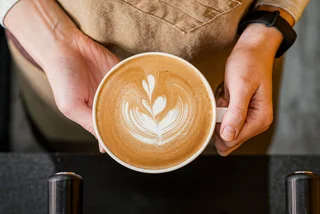After eggs, butter, and chocolate, coffee is the latest grocery item to see surging prices on Czech supermarket shelves. Consumers in the country are feeling the impact of soaring costs, as global coffee markets hit record highs and retailers adjust their pricing strategies.
The cost of coffee beans worldwide has risen sharply since the start of the year, with supermarkets passing on these increases to consumers. However, some experts argue that certain retailers in the Czech Republic are taking advantage of the situation, inflating prices to make discounts appear more attractive.
Global coffee prices on the rise
Since early January, the price of coffee on global markets has surged by nearly 25 percent, driven by a combination of unfavorable weather conditions that resulted in harvest shortages as well as supply chain disruptions. The cost of a kilogram of raw coffee beans has increased from around CZK 170 to nearly CZK 230, according to market data.
Retail prices have followed suit. According to Monika Kopčilová, a data analyst at price comparison platform Kupi.cz, the average price for a kilogram of whole-bean coffee in Czech supermarkets now stands at CZK 491, up 32 percent from last year.
Even promotional prices have risen, with discounts now offering an average of CZK 308 per kilogram, a 22 percent increase compared to 2023.
Retailers under scrutiny for pricing tactics
While rising wholesale prices justify some of the increase, analysts suggest that supermarkets are also engaging in strategic price inflation. In some cases, the cost of instant coffee has reached extreme levels.
PARTNER ARTICLE
A 200-gram jar of Jacobs Velvet instant coffee was recently listed for CZK 140 at an Albert supermarket in Prague, reports Novinky.cz. However, a smaller 180-gram plastic container of the same product was priced at CZK 289, equating to an exorbitant CZK 1,600 per kilogram.
The situation is not limited to a single retailer. At a Billa supermarket, a 100-gram package of Nescafé Gold was priced at CZK 210, bringing the per-kilo cost to CZK 2,100—comparable to the price of 12 kilograms of chicken breasts or 19 bottles of sparkling wine at the same store.
Experts warn that such pricing strategies allow retailers to later introduce seemingly attractive discounts, drawing in customers who may not realize the extent of the original markup. Savvy customers are advised to look out for genuine sales before stocking up.
No relief in sight for coffee drinkers
The impact of rising coffee prices is being felt not only in supermarkets but also in cafes, where businesses have been forced to pass on increased costs to customers.
"Our suppliers have already raised prices twice in the past year, and we have just received another price hike notice," Jozef Onderka, co-owner of Prague's historic Slavia café, told Novinky.cz. A cup of cappuccino in the Czech capital now typically costs between CZK 70 and CZK 110.
Industry experts predict that coffee prices will remain high in the coming months, as weather conditions in key coffee-producing regions continue to affect supply. Droughts in Brazil and Southeast Asia have significantly reduced coffee yields, though some relief expected in April when the next harvest arrives.












 Reading time: 2 minutes
Reading time: 2 minutes 


























